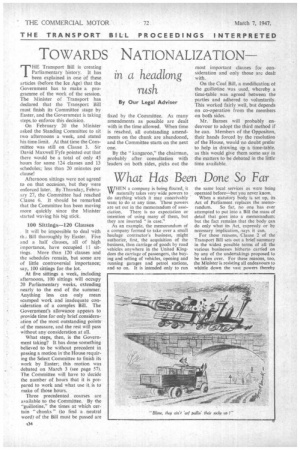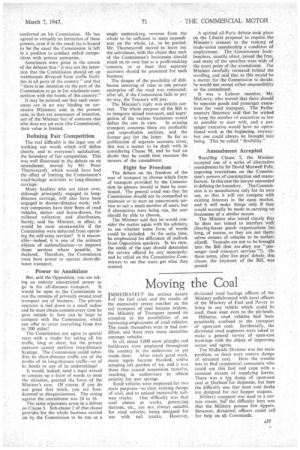What Has Been Done So Far
Page 44

Page 47

If you've noticed an error in this article please click here to report it so we can fix it.
WHEN a company is being floated, it YV naturally takes very wide powers to do anything which it may conceivably want to do at any time. These powers are set out in the memorandum of asso
ciation. There is no expectation or intention of using many of them, but they are inserted " M case."
As an example, the memorandum of a company formed to take over a small haulage contractor's business, might authorize, first, the acquisition of the business, then carriage of goods by road vehicles anywhere in the United Kingdom the carriage of passengers, the buying .and selling of vehicles, opening and running garages and petrol stations, and so on. It is intended only to run the same local services as were being operated before—but you never know. When a statutory body is set up, its Act of Parliament replaces the memo randum. So far, no one has ever attempted to put into a Bill the mass of detail that goes into a memorandum; but the fact remains that the body can do only what its Act, expressly or by necessary implication, says it can.
For these reasons, Clause 2 of the Transport Bill sets out a brief summary in the widest possible terms of all the various businesses hitherto carried on by any of the undertakings proposed to be taken over. For these reasons, too, the Minister is resisting all endeavours to whittle down the vast powers thereby conferred on his Commission. He has agreed to virtually no limitation of these powers, even if in the result (as is bound to be the case) the Commission is left in a position to conduct unfair competition with private enterprise.
Assurances were given in the course of the debates that" it was not the intention that the Commission should set up warehouses divorced from traffic facilities in all parts of the country" and that "there is no intention on the part of the Commission to go in for wholesale competition with the hotels of this country." . It may be pointed out that such assurances are in no way binding on successive Ministers; and, in the present case, as they are assurances of intention, not of the Minister but of someone else who does not yet exist (the Commission), their value is limited.
Defining Fair Competition
The real difficulty is the legal one of working out words which will define clearly, and to everyone's satisfaction, the boundary of fair competition. This was well illustrated in the debate on an amendment, moved by Mr. Peter Thorneycroft, which would have had the effect of limiting the Commission's road-haulage activities to long-distance carriage.
Many hauliers who are taken over, although principally engaged in longdistance carriage, will also have been engaged in shorter-distance work; railway companies have their fleets of road vehicles motorand horse-drawn, for railhead collection and distribution. Surely, said the Minister, in effect, it would be most unreasonable if the Commission were debarred from operating the self-same services? It is reasonable—indeed, it is one of the primary objects of nationalization—to improve those services where possible, he declared. Therefore, the Commission must have power to operate short-distance transport.
Power to Annihilate
But, said the Opposition, you are taking an entirely unrestricted power to go in for all-distance transport. It would be open to the Commission to run the remains of privately owned road transport out of business. The private operator is tied down to a small radius and he must obtain consent every time he goes outside it; how can he hope to compete with the Commission, which can offer to cover everything from five to 500 miles?
The Commission can agree to special rates with a trader for taking all his traffic, long or short, but the private operator cannot perform long-distance haulage. The Commission could subsidize its short-distance traffic out of the profits of its long-distance traffic—or of its hotels or any of its undertakings!
It would, indeed, need a legal wizard to conjure up a form of words to meet the situation, .granted the force of the Minister's case. Of course, if you do not grant that much, you are foredoomed to disappointment. The voting against the amendment was 24 to 16.
The same arguments arose in a debate on Clause 3. Sub-clause 2 of that clause provides for the whole business carried on by the Commission to be run as a
single undertaking, revenue from the whole to be sufficient to meet expenditure on the whole, i.e., to be pooled. Mr. Thomeycroft moved -to leave out the sub-clause, with the object that each of the Commission's businesses should stand on its own feet as a profit-making 'concern, or at last that separate accounts should be presented for each business.
• The danger of the possibility of deliberate lowering of rates to run private enterprise off the road was reiterated; after all, if the Commission fails to pay its way, the Treasury will pay.
The Minister's reply was strictly correct. the whole purpose of the Bill is to integrate inland transport, and segregation of the various businesses would defeat the aim in view. In existing transport concerns there are profitable and unprofitable sections, and the former pay for the latter. So far as publication of separate accounts arose, this was a matter to be dealt with in considering Clause 98. and he had no doubt that he could then reassure the movers of the amendment.
Fight for Freedom
The debate on the freedom of the user of transport to choose which form of transport provided by -the Commission he pleases should at least be mentioned. The general trend was that the Commission should not be compelled to maintain or to start an uneconomic service to suit a small number of users, but if alternatives were being run, the user should be able to choose, The Minister said that he would conskier the matter again with his advisers. to see whether some form of words could be included. At ,the same time, he emphasized his difference of outlook from Opposition speakers. in his view, the needs of the user should determine the service offered by any monopoly; and he relied on the Consultative Committees to see that users got what they wanted.
A spirited all-Party debate took place on the Liberal proposal to require the Minister's consent to the making of trade-union membership a condition of employment. The Government backbenchers, usually silent, joined the fray, and many of the speeches were wide of the exact point of the amendment. The Minister carefully retreated behind the wording, and said that as this would be a matter for the Commission to decide. he would not accept either responsibility or the amendment.
It was a Labour member. Mr. McLeavy, who moved that there should be separate goods and passenger executives for road transport. The Parliamentary Secretary said that he wished to keep the number of executives as low as possible to start with, and a passenger executive would have no operational work at the beginning, anyway; but one could always be brought into being. This he called " flexibility."
Amendment Accepted 'Recalling Clause 2, •the Minister accepted one of a series of alternative amendments by Sir David Maxwell Fyfe, imposing restrictions on the Commission's powers of construction and manufacture. In this case the lawyer succeeded in defining the boundary, The Commission is to manufacture only for its own use, so that it will not compete with existing interests in the open market, and it will make things only if theywould normally be made in carrying on businesses of a similar nature.
The Minister also stated clearly that he does not intend to interfere with clearing-house goods organizations (so long, of course, as they are not themselves owners of vehicles to be nationalized). Taxicabs are not to be brought into the Bill (but are .they not "passenger road transport services "?). On these notes, after five days' debate, this clause, the keystone of the Bill, was passed.












































































